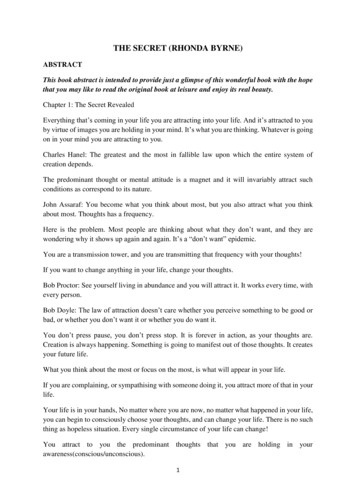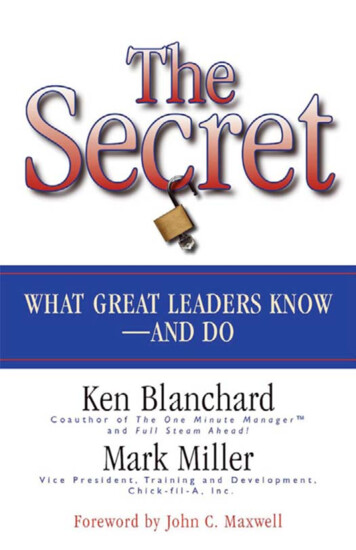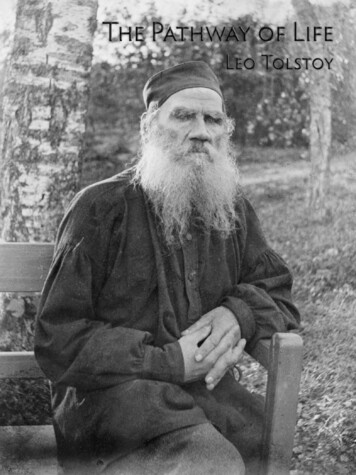
Transcription
The Secret of Successi
The Secret of SuccessWritingsThought Force in Business and Everyday LifeThe Law of the New ThoughtNuggets of the New ThoughtMemory Culture: The Science of Observing, Remembering and RecallingDynamic Thought or The Law of Vibrant EnergyThought Vibration or the Law of Attraction in the Thought WorldPractical Mind‑ReadingPractical Psychomancy and Crystal GazingThe Mind Building of a ChildThe Secret of Mental MagicMental FascinationSelf‑Healing by Thought ForceMind‑Power: The Law of Dynamic Mentation (The Secret of Mental Magic)Practical Mental InfluenceReincarnation and the Law of KarmaThe Inner ConsciousnessThe Secret of SuccessThe New Psychology of HealingMemory: How to Develop, Train and Use ItSubconscious and the Superconscious Planes of MindSuggestion and Auto‑SuggestionThe Art of Logical Thinking or the Laws of ReasoningThe Will: It’s Nature, Power and DevelopmentThought‑Culture or Practical Mental TrainingThe New Psychology: Its Message, Principles and PracticeHuman Nature: Its Inner States and Outer FormsMind and Body or Mental States and Physical ConditionsThe Art of Expression and the Principles of DiscourseThe Psychology of SalesmanshipThe Psychology of Success or Mental Paths to PowerTelepathy: Its Theory, Facts and ProofThe Crucible of Modern Thought: A Study of the Prevailing Mental UnrestScientific ParenthoodThe Message of the New Thought (New Thought: Its History and Principles)Your Mind and How to Use It: A Manual of Practical PsychologyThe Mastery of Being: A Study of the Ultimate Principle of Realityii
The Secret of SuccessA Course of Nine Lessons on the Subject of theApplication of the Latent Powers of the IndividualToward Attainment of Success in Life.1908William Walker Atkinson1862–1932信YOGeBooks: Hollister, MO2013:09:06:13:29:17iii
The Secret of SuccessCopyrightYOGeBooks by Roger L. Cole, Hollister, MO 65672 2010 YOGeBooks by Roger L. ColeAll rights reserved. Electronic edition published 2010isbn: 978‑1‑61183‑082‑8 (pdf)isbn: 978‑1‑61183‑083‑5 (epub)www.yogebooks.comiv
ContentsLesson I.The Secret of Success.The Fundamental Rules of Success. The Instinctive Impulse how to Succeed. The Leadersamong men. The Unfoldment of Individuality.Lesson II. The Individual.Individuality and Personality. What the Self really is. What is the Individual which manifeststhe Power of the Self. The Master in the Brain.Lesson III.Spiritedness.Spiritedness not a fanciful, vague quality, but a real, live, forceful Power in Man. The Assertionof Recognition of Mastery. A wonderful Soul-quality.Lesson IV. Latent Powers.The part played by Earnestness, Enthusiasm and Desire. The Manifestation of Will-Power.The Will and what lies behind it.Lesson V. Soul‑Force.The Energy of Enthusiasm, and what it really means. What Enthusiasm accomplishes. Howto communicate Enthusiasm.Lesson VI.The Power of Desire.The Motive Force that runs the world. A useful servant but a poor master. How to CreateDesire. How to apply its wonderful Energy. How to extend the Mind Force by Desire.Lesson VII. The Law of Attraction.Nature’s Great Law. From Atom to Man. How to draw to us the things we Desire or Fear.Desire Force. How to cultivate and master this great power of the Mind. Fearthought andhow to overcome it.v
The Secret of SuccessLesson VIII.Personal Magnetism.The Rationale of Personal Magnetism. What it is and what it does. How it affects others. Themagnetic attraction manifested by certain people.Lesson IX.Attractive Personality.How to acquire an Attractive Personality. The Charm of Personality. The quality of SelfRespect, Confidence and Mastery—What it does for one, and Develops its Personal qualitiesand traits that make for success, and how to acquire them.vi
The Secret of Success1
The Secret of Success2
Lesson I.The Secret of Success.The Fundamental Rules of Success. The Instinctive Impulse how to Succeed. The Leadersamong men. The Unfoldment of Individuality.It is with some hesitation that we bring ourselves to writethis little book, entitled “The Secret of Success.” Not that weare not in sympathy with the subject—not that we do notbelieve that there is a “Secret of Success”—but because therehas been so much written on the subject of “Success” that isthe veriest twaddle—masses of platitudinous wordiness—that we hesitate to take the position of a teacher of Success.It is so easy to fill pages of paper with good advice—it is somuch easier to say things than to do them—so much easierto formulate a code of precepts than to get out into the fieldof active endeavor and put into practice the same percepts.And, you may imagine why we hesitate to assume a role whichwould lay us open to the suspicion of being one of the “do as Itell you, and not as I do” teachers of the Art of Success.But there is another side of the question. There is, besides themere recital of a List of Good Qualities Leading to Success—alist with which every schoolboy and reader of the magazines isacquainted—a Something Else; and that Something Else, is a3
The Secret of Successsuggestion that the Seeker for Success has a Something Withinhimself which if expressed into activity and action will prove ofgreat value to him—a veritable Secret of Success, instead of acode of rules. And, so we propose to devote this little book tounfolding our idea of what this Something Within is, and what itwill do for one who will unfold it and thus express it into action.So, therefore, do not expect to find this book a “CompleteCompendium of Rules Conducive to Success, Approved of andFormulated by the Successful Men of the World who becameacquainted with these Rules only after they had AttainedSuccess, and consequently had Time and Inclination to Preachto Others.” This is not a book of that sort. It is Quite Different.We hope you will like it—it will do you good in any event.All people are striving and seeking Success. Their idea ofSuccess may differ, but they have all agreed upon the desirabilityof Attainment. “Attainment”—that is the word, whichembodies the essence of that which we call Success. It is the“Getting‑There” idea—the idea of Attainment—of Reaching theGoal for which we set out. That is the story—Attainment.Many men and women have endeavored to point out theway to Success, and while some have rendered valuable serviceto those who were following them on the Path of Attainment,yet none have been able to tell the whole story of Success. Andthis is not to be wondered about, for the reason that on theroad to Success each and every individual must be, in a measurea law unto himself, or herself. No two temperaments are exactlyalike—Nature delights in variety; no two sets of circumstancesare precisely the same—infinite variety manifests here also. Andso it would be folly to attempt to lay down rules of universalapplication, which would surely lead all to the great goal ofSuccess. One has but to look around him on all sides and seethe different needs of the different individuals composing thecrowd, in order to recognize the futility of any attempt tolay down lines of universal instruction on this subject. Eachand every man who has succeeded has done so in a different4
The Secret of Successway—generally along some original lines of action—in fact,the faculty or characteristic known as Individuality, seems tohave played an important part in the success of the majority ofpersons who have attained it. And Individuality renders thosepossessing it to a marked degree to be likely to depart fromany set of rules or laid‑out courses of action. And so, it may bestated as a general principle that each must work out his ownSuccess along the lines of his own Individuality, rather than byfollowing any set rule or line of conduct.In view of what we have just said, it may seem strange thatfeeling as we do we have ventured to write a little book entitled“The Secret of Success,”—particularly as we have started thesaid book by declaring the impossibility of laying down anyset rules on the subject. This may seem like a paradox, but alittle examination will show you that it is not so. It is true thatwe believe that each and every person must work out his ownSuccess, along the lines of his own Individuality, instead of alongsome cut‑and‑dried plan. And right here is where the “Secretof Success” comes in. “Along the lines of his own individuality,”we have just said—then it must follow that one must possessIndividuality before he may work along its “lines.” And in themeasure that he possesses Individuality, so will he possess thefirst prerequisite to Success. And that is what we mean by “TheSecret of Success”—Individuality.Every person possesses dormant and latent Individuality—but only a few allow it to express itself. The majority of us arelike human sheep trotting along complacently after someself‑assertive bellwether, whose tinkling bell serves to guide ourfootsteps. We have absorbed the notion somehow that thesebellwethers possess the sum and substance of human knowledgeand power, and ability to think—and instead of unfolding ourown dormant powers, and latent possibilities, we allow themto remain in obscurity, and we trot along, jogitty‑joggity‑jogafter our pet bellwether. People are very much like sheep inthis way—they are obedient and imitative animals, and rather5
The Secret of Successthan assume the responsibility of directing their own footsteps,they wait until someone takes the lead, and then away theystampede after him. Is it any wonder that the leaders claim thechoicest pickings for themselves, and allow the flock to get onlythe scrubby grass? Not a bit of it—they have earned the choicebits by reason of lock of Individuality and Initiative on the partof those following them—in fact, they were chosen as leadersbecause of this self‑assertive, and self‑directive quality. If theyhad stood back in a modest, mild manner, they would havebeen pushed aside by the flock that would disclaim them asleaders, in favor of others who knew how to push to the front.Now, in this little book we shall not endeavor to awaken aspirit of “bellwetherism” in you, nor to urge you to strive to leadthe flock—there is nothing in the mere leading of people otherthan vainglory and petty self‑satisfaction. The desirable thingis to possess sufficient Individuality and Initiative to be yourown bellwether—to be a law unto yourself, so far as other menare concerned. The great men—the strong men—care nothingfor the flock, which so obediently trots along after them. Theyderive no satisfaction from this thing, which pleases onlyinferior minds, and gratifies only petty natures and ambitions.The big men—the great spirits of all ages—have derived moresatisfaction from that inward conviction of strength and abilitywhich they felt unfolding into activity within themselves, thanin the plaudits of the mob, or in the servility of those imitativecreatures who sought to follow in their footsteps.And, this thing called Individuality is a real thing. Inherentin each of us, and which may be developed and brought intoactivity in each one of us if we go about it right. Individualityis the expression of our Self—that Self which is what we meanwhen we say “I”. Each of us is an Individual—an “I”—differingfrom every other “I” in the universe, so far as personal expressionis concerned. And in the measure that we express and unfoldthe powers of that “I”, so are we great, strong and successful.We all “have it in us”—it depends upon us to get it out into6
The Secret of SuccessExpression. And, this Individual Expression lies at the heart ofthe “Secret of Success”. And that is why we use the term—andthat is what we shall tell you about in this little book. It will payfor you to learn this “Secret”.7
The Secret of Success8
Lesson II.The Individual.Individuality and Personality. What the Self really is. What is the Individual which manifeststhe Power of the Self. The Master in the Brain.In our last lesson we stated that we considered the “Secret ofSuccess” to consist principally of the Free Expression of theIndividual—the “I.” But before you will be able to apply thisidea successfully, you must first awaken to a realization of whatthe Individual—the “I” within you—really is. This statementmay appear ridiculous at first to many of you, but it will payyou to acquaint yourself fully with the idea behind it, for uponthe true realization of “I” comes Power.If you will stop and take stock of yourself, you will find thatyou are a more complex being than you had at first consideredyourself to be. In the first place there is the “I,” which is the RealSelf or the Individual, and there is the “Me,” which is somethingattached to and belonging to the “I”—the Personality. Forproof of this, let the “I” take stock of the “Me,” and it will findthat the latter consists of three phases or principles, i. e. (1) thePhysical Body; (2) The Vital Energy; (3) The Mind. Many peopleare in the habit of regarding their bodies as the “I” part of them,but a little consideration will show them that the body is but a9
The Secret of Successmaterial covering, or machine through which and by means ofwhich the “I” is able to manifest itself. A little thought will showthat one may be vividly conscious of the “I Am” part of himselfwhile totally oblivious of the presence of the physical body. Thisbeing so, it follows that the “I” is independent of the body, andthat the latter falls into the “Me” classification. The physicalbody may exist after the “I” has left it—the dead body is not the“I.” The physical body is composed of countless particles whichare changing places every moment of our lives—our body oftoday is entirely different from our body of a year ago.Then comes the second principle of the “Me”—the VitalEnergy, or what many call Life. This is seen to be independentof the body, which it energizes, but it, too, is transitory andchangeable, and readily may be seen to be but a somethingused to animate and energize the body—an instrument of the“I,” and therefore a principle of the “Me”. What, then, is left tothe “I” to examine and determine its nature? The answer thatcomes naturally to the lips is, “The Mind, by which I know thetruth of what you have just said.” But, stop a moment, you havesaid, speaking of the mind, “by which I know”—have you not, insaying this, acknowledged the mind to be a something throughwhich the “I” acts? Think a moment—is the mind you? You areaware that your mental states change—your emotions vary—your feelings differ from time to time—your very ideas andthoughts are inconsistent and are subject to outside influences,or else are molded and governed by that which you call “I”, oryour Real Self. Then there must be something behind MentalStates, Ideas, Feelings, Thoughts, etc., which is superior to themand which “knows” them just as one knows a thing apart fromitself but which it uses. You say “I” feel; “I” think; “I” believe; “I”know; “I” will; etc. , etc. Now which is the Real Self? The MentalStates just mentioned or the “I” which is the subject or RealCause of the mental phenomena? It is not the Mind that knows,but the “I” which uses the Mind in order to know. This mayseem a little abstruse to you if you have never been made a10
The Individualstudy of the subject, but think it over a little and the idea willclearly define itself in your mind.We are not telling you these things merely to give you an ideaof metaphysics, philosophy, or psychology—there are manybooks that go into these matters at length and in detail—so itis not for that reason. The real reason is that with a realizationof the “I” or Real Self, comes a sense of Power that will manifestthrough you and make you strong. The awakening to arealization of the “I”, in its clearness and vividness, will cause youto feel a sense of Being and Power that you have never beforeknown. Before you can express Individuality, you must realizethat you are an Individual. And you must be aware of this “I”within you before you can realize that you are an Individual.The “Me” side of you is what is called Personality, to theouter appearance of yourself. Your Personality is made up ofcountless characteristics, traits, habits, thoughts, expressionsand motions—it is a bunch of peculiarities and personal traitsthat you have been thinking was the real “I” all this time. But itis not. Do you know what the idea of Personality arose from?Let us tell you. Turn to the pages of any good dictionary, andyou will see that the word originated from the Latin word“Persona”, meaning “a mask used by actors in ancient times”,and which the word in turn was derived from two other words,“sonare,” meaning to “sound,” and “per,” meaning “through,”the two words combined meaning “to sound through”—theidea being that the voice of the actor sounded through themask of the assumed personality or character. Webster givesthe following as one of the meanings of “Person,” even to thisday: “A character or part, as in a play; an assumed character.” Sothen, Personality means the part you are playing in the GreatPlay of Life, on the Stage of the Universe. The real Individualconcealed behind the mask of Personality is you—the RealSelf—the “I”—that part of you which you are conscious whenyou say “I am,” which is your assertion of existence and latentpower. “Individual” means something that cannot be divided or11
The Secret of Successsubtracted from—something that cannot be injured or hurt byoutside forces—something real. And you are an Individual—aReal Self—an “I”—Something endowed with Life, Mind, andPower, to use, as you will. A poet named Orr wrote:“Lord of a thousand worlds am I,And I reign since time began;And night and day, in cyclic sway,Shall pass while their deeds I scan.Yet time shall cease ere I find release,For I am the soul of Man.”12
Lesson III.Spiritedness.Spiritedness not a fanciful, vague quality, but a real, live, forceful Power in Man. The Assertionof Recognition of Mastery. A wonderful Soul-quality.To many of you, the title of this lesson—Spiritedness—may seem to have some connection with “spirits,”“disembodied entities,” or else the “soul” or some higherpart of it, to which the name Spirit is often applied. But, inthis case, we use the word in a different sense, and yet in asense approved by many advanced teachers and investigatorsof the occult and spiritual. One of the meanings of the word”spirit” as given by Webster is as follows: “Energy, vivacity, ardor,enthusiasm, courage,” etc., while the same authority definesthe word “spirited” as: “Animated; full of life and vigor, lively,”etc. These definitions will give you a hint of the sense in whichwe are now using the term, but there is still more to it.To us the word Spirit expresses the idea of the real essentialnature of the Universal Power, and which is also manifestedin man as the center of his being—his essential strength andpower, from whence proceeds all that renders him an Individual.Spiritedness does not mean the quality of being ethereal,“goody‑goody,” spiritual, otherworldly, or anything of that sort.13
The Secret of SuccessIt means the state of being “animated,” meaning, “possessed oflife and vigor”—so that the state is really that of being filledwith Power and Life. And that Power and Life comes from thevery center of one’s being—the “I am” region or plane of mindand consciousness.Spiritedness is manifested in different degrees amongdifferent men—and even among the animals. It is an elementary,fundamental, primitive quality and expression of Life, anddoes not depend upon culture, refinement or education—its development seems to depend upon such instinctive orintuitional recognition of the Something Within—the Powerof the Individual which is derived from that Universal Powerof which we are all expressions. And even some of the animalsseem to possess it.A recent writer on the “Taming of Animals” expressesinstinctive realization of Spiritedness among some of the higheranimals as follows: “Put two male baboons in the same cage,and they will open their mouths, show all their teeth, and ‘blow’at each other. But one of them, even though he may possessthe uglier dentition, will blow with a difference, with an inwardshakiness that marks him as the under dog at once. No test ofbattle is needed at all. It is the same with the big cats. Put two, orfour, or a dozen lions together, and they also, probably withouta single contest, will soon discover which one of them possessesthe mettle of the master. Thereafter he takes the choice of themeat; if he chooses, the rest shall not even begin to eat until hehas finished; he goes first to the fresh pan of water. In short he is‘king of the cage. ‘Now, then, when a tamer goes into a den witha big cat that has taken a notion to act ‘funny,’ his attitude isalmost exactly that of the ‘king beast’ above mentioned wouldbe toward a subject rash and ill advised enough to challengehis kingship.”You will notice in the above quotation, that the writer statesclearly that it is not always the baboon with the fiercest tusksthat is the master, neither does the “king lion” necessarily assert14
Spiritednesshis dominion by winning a physical fight—it is somethingfar more subtle than the physical—it is the manifestation ofsome soul quality of the animal. And so it is with men, it is notalways the biggest and strongest physically who rule—the rulerbecomes so by reason of the mysterious soul quality which wecall Spiritedness, and which men often call “nerve,” or “mettle,”or “sand.” When two individuals come into contact with eachother there is mental struggle—there may not be even a worduttered—and yet soul grapples with soul as the two pairs ofeyes gaze into each other, and a subtle something in eachengages and grapples with a subtle something in the other.It may be all over in a moment, but the conflict is settled forthe time, and each of the mental combatants knows that he isvictor or defeated, as the case may be. There may be no feelingof antagonism between the parties engaging, but neverthelessthere seems to be an inward recognition on both sides thatthere is something between them that has to be settled at once.The parties may become the best of friends, and yet one ofthem always leads. And this leadership does not depend uponphysical strength, intellectual attainment, or culture in theordinary sense, but upon the manifestation and recognition ofthat subtle quality that we have called Spirit.People unconsciously assert their recognition of qualityin themselves and others, by their use of the term. We oftenhear of people “lacking spirit”; being “spiritless”; and of othershaving had “their spirit broken;” etc. The term is used in thesense of “mettle.” A “mettled” horse or man is “high‑spirited,”according to the dictionaries; and the same authorities define“mettlesome” as “full of spirit,” so you see the term is used aswe have employed it—but the explanation of the sourceof the “spiritedness” is not given. Breeders of thoroughbredracing horses will tell you that a horse having “spirit” willrun a gamer race and will often outdistance and out‑wind ahorse having higher physical characteristics, but less “spirit”or “class.” Horsemen insist that the possession of “spirit” in a15
The Secret of Successhorse is recognized by the other horses, who are effected by itand become discouraged and allow themselves to be beaten,although often they may be better racing machines, physically.This spirit is a fundamental vital strength possessed by all livingthings in degrees—and it may be developed and strengthenedin one’s self. In our next lesson we shall recite a few instances ofits manifestation among men.Oliver Wendell Holmes, in one of his books, gives thefollowing vivid description of the conflict of spiritednessbetween two men: “The Koh‑i‑noor’s face turned so white withrage that his blue‑black mustache and beard looked fearfulagainst it. He grinned with wrath, and caught at a tumbler, asif he would have thrown its contents at the speaker. The youngMarylander fixed his clear, steady eye upon him, and laid hishand on his arm, carelessly almost, but the Jewel felt that hecould not move it. It was no use. The youth was his master, andin a deadly Indian hug in which men wrestle with their eyes, overin five seconds, but which breaks one of their two backs, andis good for three score years and ten, one trial enough—settlesthe whole matter—just as when two feathered songsters of thebarnyard, game and dunghill, come together. After a jump ortwo at each other, and a few sharp kicks, there is an end to it;and it is ‘After you, monsieur,’ with the beaten party in all thesocial relations for all the rest of his days.”Fothergill says: “Emily Bronte sketched out her ideal of abeing possessed of immense willpower in a thorough ruffian—Heathcliff. A massive, muscular brute! Well, it was a girl’sconception of a strong man; but I think I have seen some quiet,inoffensive‑looking men in spectacles, who could very soonhave shown the ruffian where the superiority lay.”A celebrated historical example of Spiritedness, underapparently overwhelming odds, is that of the interview betweenHugo, Bishop of Lincoln and Richard Coeur de Lion, in thechurch of Roche d’Andeli. In his desire to prosecute the war inNormandy, Richard demanded additional supplies and money16
Spiritednessfrom his barons and bishops, but Hugo refused to furnish menor money. He claimed that although the See of Lincoln waslegally bound to supply men and money for military servicewithin the four seas of Britain, the war in Normandy did notcome under that head, and he defied the king. King Richard,called the Lion‑Hearted, was a dangerous man to defy, andso when he summoned Bishop Hugo to Normandy, and thelatter went forth to beard the lion in his den, few doubted theoutcome, and the bishop’s downfall was taken as a matter ofcourse. When the bishop landed in Normandy two friendlybarons who informed him that the king was in a terrible rageagainst him, and who advised him to send some humble,conciliatory message to him before entering the royal presence.But the bishop refused to do this, and proceeded boldly tomeet his monarch. Richard was sitting at Mass when the bishopentered. Hugo walked up to him, and disregarding his frown,said, “Kiss me, my lord King!” Richard turned wrathfully away,withholding his salute. But Hugo, gazing into his eyes, andshaking the royal shoulder vigorously, repeated his demand.“Thou hast not deserved it,” roared the king in anger and chagrin.“I have,” retorted Hugo, shaking the royal shoulder the harder.The king gradually dropped his eyes from those of the bishop,and gave the kingly salute and kiss, and the bishop passed oncalmly to take part in the service. Hugo afterward defied theking in his council chamber, and persisted in his refusal, andeven ventured to rebuke his royal master for infidelity to thequeen. The council was astounded, for knowing Richard’scourage and fiery temper they expected to see Hugo crush ina moment—but instead he emerged the victor in the struggleof Spiritedness. The historian says: “The Lion was tamed for themoment. The King acknowledged nothing, but restrained hispassion, remarking afterward, ‘If all bishops were like my lord ofLincoln, not a prince among us could lift his head among them.’”And this was not the first time that this doughty Bishop ofLincoln had vanquished a king. In his earlier days, shortly after17
The Secret of SuccessKing Henry Plantagenet had created him bishop, he becameinvolved in a fierce dispute with that monarch. Henry wasat Woodstock Park surrounded by his courtiers when Hugoapproached. The king feigned not to see the bishop, taking nonotice whatsoever of him. After a few moments of strainedsilence, the bishop, pushing aside a powerful earl who wasseated by the king’s side, took his place beside the king. Theking pretended to be mending his leather glove. The bishopcheerfully and lightly said: “Your Majesty reminds me of yourcousin at Falaise.” Falaise was the place at which Henry’s ancestorDuke Robert met Arlotta, the daughter of a tanner of leather,who bore him his illegitimate son who was afterward known asWilliam the Conqueror. The Bishop’s impudent allusion to theking’s ancestry was too much for the latter, and he was badlyworsted in the encounter and later acceded to the wishes ofthe bishop.But as Fothergill truly says: “It is a great mistake to supposethat this Will is disposed to air itself on all occasions; far from it.It often has a tendency to conceal itself, and is not rarely foundunder and exterior of much pleasantness. There are men, andwomen, too, who present an appearance of such politenessthat they seem to have no will of their own; they apparentlyexist merely to do what is agreeable to others; but just wait tillthe time comes, and then the latent will‑power is revealed, andwe find under this velvet glove the iron hand—and no mistakeabout it. It is the secret of the diplomatist. Talleyrand possessedit to a remarkable degree, and was a cool, bold, successfuldiplomat; Cavour also possessed this power and used it wisely.The blusterer and bragge
The Secret of Success 4 suggestion that the Seeker for Success has a Something Within himself which if expressed into activity and action will prove of great value to him—a veritable Secret of Success, instead of a code of rules. And, so we propose to devote this little book to unfolding our idea of what this Something Within is, and what it










